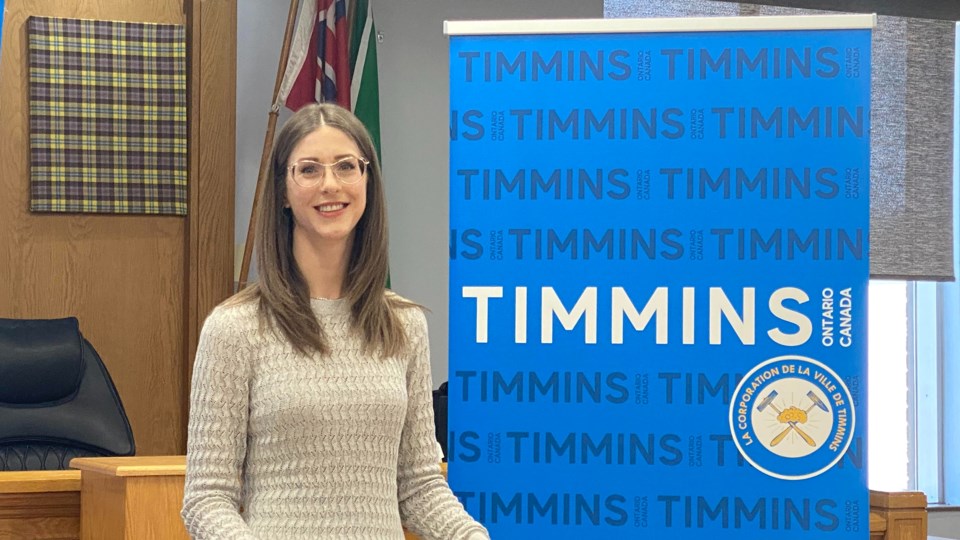TIMMINS - The mayor has been stepping back a little, but says she's still very much involved in the city's work.
In September, Mayor Michelle Boileau welcomed her second child, Felix. When she announced her pregnancy in April, the plan was to take a five-month pregnancy and parental leave starting in late September or early October.
In the weeks following the arrival of baby Felix on Sept. 23, she wanted to stay involved and didn't submit notice for maternity leave, which allows for a member on pregnancy or parental leave can be absent for 20 weeks.
"Of course, I have taken a bit of a step back. My calendar is much lighter than it was before," she said.
It means residents may see the mayor at public events, but not chairing Timmins council meetings; she hopes to be back in that seat before the holidays.
"Some people think I'm on leave because they don't seem at that table. But of course, there's a lot more to this role than just those biweekly meetings," said Boileau, adding she's participating in the prep meetings held the week before council to set the agenda.
When it comes to politics, there's no written contract.
Municipally, there's only one full-time politician — the mayor.
RELATED: Timmins council remuneration, expenses up over $85K
Unlike typical jobs, the mayor has no singular document laying out work hours or when they'll be in the office. Instead a number of municipal policies and the overarching Ontario Municipal Act lay out basic expectations.
Essentially, the chief executive officer (CEO) in the municipality — which all mayors are under the Municipal Act — has no contract holding them to when and where they work or how it's communicated.
It's a question Boileau asked on the first day of the job — what are the job expectations and deliverables.
“With this kind of job, even before having the baby, there's no set hours, as you could imagine, as everyone can imagine. People are reaching out at all times of the day. Things happen ... incidents or emergencies where I'm getting called at all times of the day," she said.
"It's not a 9-5, Monday to Friday, you have to be at your desk."
Even if there was a set contract, she said it would be ever-changing.
"Priorities are changing in the municipality annually, monthly, if not daily,” she said.
One of the lessons of the pandemic, said Boileau, is working remotely. Most meetings are virtual or have a virtual option.
It means she can continue continue doing a lot of her activities and choosing, when possible, to attend events in person.
"I'm really fortunate that I've been able to call on my fellow councillors and rely on them to be able to do some of that for me," she said.
The mayor's office, said Boileau, is still accessible.
"I am on my emails, I've been having calls with residents. If there are concerns, please do reach out to the mayor's office because it will get to me and I'll be able to respond. I've been very fortunate that everyone's been patient and showing me grace and flexibility, and I very much appreciate that. But I'm here," she said, adding she's still very much involved in the work.
In other areas, when the mayor is away the deputy mayor steps into the role.
Because Timmins has no elected deputy mayor, at the start of the council term a list is created that has each councillor taking a six-month stint where it's their role to fill in when the mayor's not available. They are not paid extra to fill in.
Cory Robin's turn runs June 1 to Nov. 30, 2024, and Andrew Marks steps up Dec. 1, 2024 to May 31, 2025.
The deputy mayor has most of the mayor's events in their calendar as a placeholder, and Boileau said she communicates with them in the days leading up to them about what's happening.
The policy of it all
The main guiding document for municipalities is the Ontario Municipal Act.
It lays out the roles of the head of council. The top three are to act as the CEO, preside over council meetings, and provide leadership to the council.
The City of Timmins has a council code of conduct. It's described as a value-based reference to "encourage the highest standards of ethical behaviour to uphold the public trust."
"Public expectations for those holding public office are extremely high," it reads at the start of the procedures section, right before laying out the mayor's expectations.
As the CEO of Timmins, the policy lays out the same guidelines as the Municipal Act.
It calls for the head of council to uphold and promote the purposes of the municipality, promote public involvement in the city's activities, represent and promote the city locally and beyond, and participate in and foster activities enhancing the economic, social and environmental well-being of the city and its residents.
The city's pregnancy and parental leave policy allows members to be away from meetings for 20-straight weeks unless council, though it can be longer if approved by council.
The Municipal Act allows for members to be absent from meetings for three consecutive months — which, for Timmins, is six council meetings as there are typically two meetings a month — before either declaring the seat vacant or a passing a resolution to allow the absence.
